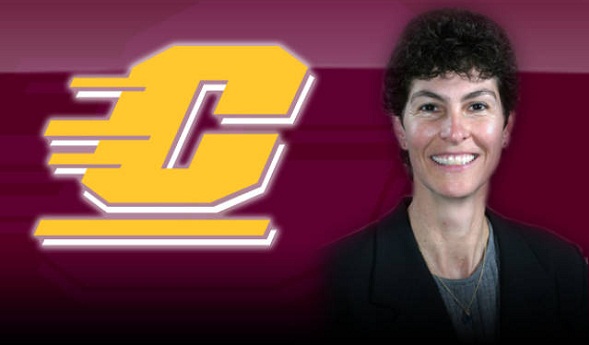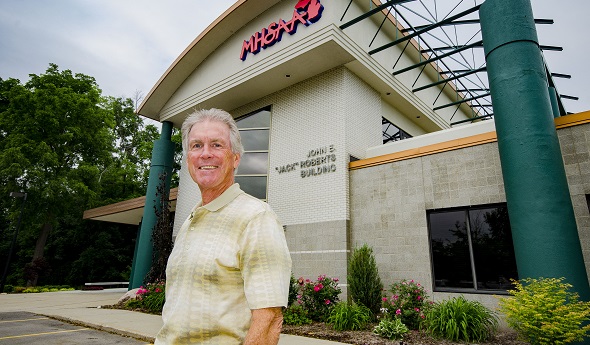
Lessons Learned Keep Paying Off
February 8, 2013
By Terri Finch Hamilton
Reprinted with permission of CMUChippewas.com
Gina Mazzolini's parents taught her to be a good person first, a good student second, and a good athlete after that. But Mazzolini says her involvement in sports at CMU taught her things that went way beyond the classroom.
"At Central, I learned women are just as good as men -- or better," says Mazzolini, assistant director at the Michigan High School Athletic Association. "I learned that if we put our minds to it, we can do anything."
A star athlete in volleyball and basketball at CMU from 1974 to 1978, Mazzolini says college sports helped her soar after the limitations for girls in high school sports in the early 1970s.
"In high school, women were always taking the back seat to men," says Mazzolini, 57. "I didn't see women in leadership positions in high school. Girls couldn't use the weight room -- we had to sneak in, then we'd get kicked out. They'd look at me and say, 'Why would you want to lift weights?'
"When the guys were done with the gym, then we could use it."
As an athlete at St. Johns High School, Mazzolini was just starting to compete competitively, she says. She won the school's first ever female athlete of the year award.
"Then I went to Central Michigan, and my teammates were all the best kids from their high school teams. Suddenly, everybody was good. And everybody we played against was good."
It was eye opening, she says.
"You learn a lot about yourself," she says. "If you can survive a practice, if you can survive playing Michigan State, you get confidence. I realized I was good. I learned how to be competitive, in a good way."
In basketball, she led the Chippewas in scoring and rebounding three straight seasons - averaging in double figures in both categories. After graduating from CMU, Mazzolini went on to teach and coach at the high school and college levels. She was inducted into the CMU Athletic Hall of Fame in 1992.
A few years later, Mazzolini received the 2009-10 Women In Sports Leadership Award by the Representative Council of the MHSAA.
So much of what she learned on the college volleyball and basketball courts prepared her for later success, Mazzolini says.
"In athletics, you can't worry about what just happened," she says. "You control your emotions, you take a deep breath, you move forward."
Good advice on any day, she says.
"You learn that you don't always win, and you learn to take defeat gracefully," she says. "Later, in your business life, you're not going to win everything, either. Sports teaches you how to deal with setbacks, how to work hard and rearrange your goals so that you do better next time.
"You learn if you work together, you can achieve amazing things."
CMUChippewas.com is running a series of stories to celebrate the 40th anniversary of Title IX legislation. Click to see more of the series.

MHSAA Building Named for Retiring Director
By
Geoff Kimmerly
MHSAA.com senior editor
June 26, 2018
To recognize 32 years of leadership and service to Michigan educational athletics, the MHSAA Representative Council has named its home office in East Lansing after longtime Executive Director John E. “Jack” Roberts, who will retire in August.
The dedication of the “John E. ‘Jack’ Roberts Building” was approved by the Council during its Spring Meeting, May 6-7 in Gaylord, with the fabrication and assembly of the lettering financed by several private donations.
The building, located at 1661 Ramblewood Drive in East Lansing, opened as headquarters for the Association on January 3, 1997. The 20,000-square-foot, two-story facility houses MHSAA staff offices and resources including a publications library, plus multiple conference spaces frequently used to host meetings not only for MHSAA business but by leagues, coaches associations and other groups joining people from across the state.
Roberts, who announced his retirement April 24, will conclude his tenure next month as the second-longest serving full-time executive director during the MHSAA’s 94-year history. He is the fourth person to serve that leadership role full time, following Charles E. Forsythe (1931-42, 1945-68), Allen W. Bush (1968-78) and Vern L. Norris (1978-86). Roberts currently is also the nation’s longest-serving executive director of a state high school athletic association.
“This is an entirely unexpected honor,” Roberts said, “and while I am proud of the building, I’m even prouder of the people who have worked in it.”
The metallic lettering announcing the building’s name was designed by Image360 of Brighton and placed on the façade at the center of the building below the large MHSAA logo facing the property’s parking lot.
John Peckham, then of Martin Property Development of East Lansing, oversaw the original Ramblewood project. The building was designed by Keystone Design and built by Granger Construction.
Prior to the move to its current offices, the MHSAA was housed at 1019 Trowbridge Road in East Lansing from 1976-96. The MHSAA moved to the Trowbridge location from a downtown Lansing office it had leased since 1958.
With his retirement upcoming, Roberts also will leave the National Federation of State High School Associations (NFHS) Board of Directors later this week during the Summer Meeting in Chicago. He also will conclude an extended term as board chairperson of the NFHS Network. Roberts previously served as an assistant director for the National Federation from 1973-80 and came to the MHSAA in the fall of 1986 from the Fellowship of Christian Athletes, which he served as executive vice president.
Assistant Director Mark Uyl was chosen by the Representative Council in May to succeed Roberts as MHSAA executive director.
The MHSAA is a private, not-for-profit corporation of voluntary membership by more than 1,500 public and private senior high schools and junior high/middle schools which exists to develop common rules for athletic eligibility and competition. No government funds or tax dollars support the MHSAA, which was the first such association nationally to not accept membership dues or tournament entry fees from schools. Member schools which enforce these rules are permitted to participate in MHSAA tournaments, which attract more than 1.4 million spectators each year.

